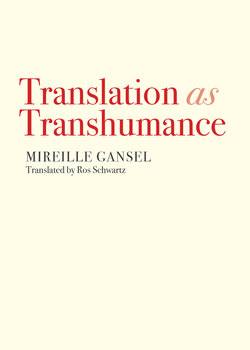Читать книгу Translation as Transhumance - Mireille Gansel - Страница 14
На сайте Литреса книга снята с продажи.
ОглавлениеA TREE PLANTED BY THE POET
When I was thirteen or fourteen, I was given a school travel grant. We wandered through the ruins of Dresden. I didn’t know then that it was the Allies who had deliberately reduced an area of light and beauty to ashes. An area without borders, belonging to an entire people, to all peoples. I didn’t yet know that there are silences that are also ways of rewriting history. I saw an old woman begging beside the Elbe. I began to speak to her, but the teacher accompanying us came over to stop me. Those gagged words haunted me for a long time; I felt a sense of betrayal. The words of the other, words reaching out to the other. Failing to take the step, to cross the border. I have never forgotten that broken figure in her black shawl, a German woman in mourning.
In Weimar, Goethe’s house on the vast Frauenplan. The first time I had been inside a poet’s home. I walked around it with reverence, as if it were a sanctuary of the mind. I was looking for slivers of life, of presence, in that huge mansion that had remained intact amid so many ruins. An absence that was peopled by poems. The voice of the poems I had just discovered and which spoke to me as though they were written in a private language. On that trip, I was also taken to Buchenwald. I did not know then that two or three years earlier, there had still been deportees there, prisoners of the Soviet police. In the camp’s deserted avenues, we were told about the struggle of the anti-fascists. One of the things I remember from that day is a huge, black death slab made of concrete or cement. A screed of silence. I didn’t know yet what I would later discover—that words and silences can be used to create languages known as doublespeak. And one day too I would find out that at Buchenwald there was “somewhere within the area of our camp, so they say, marked with a commemorative plaque and protected from us prisoners by a fence, a now nobly spreading tree, planted with his own hand,”1 by the poet Goethe. Imre Kertész wrote those words with the eyes and words of his fourteen-year-old self, a Jewish child deported to Buchenwald.
Many years later, in a Berlin café, he told me that although he wrote in Hungarian, he still thought in the German of the Austro-Hungarian Empire. That supranational, cross-border language in which he had grown up. An impregnable territory which no barbed-wire fence, no watchtower, would ever be able to restrict or enclose, over which no barbarism would ever be able to cast its shadow.
